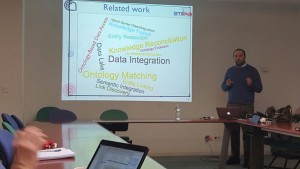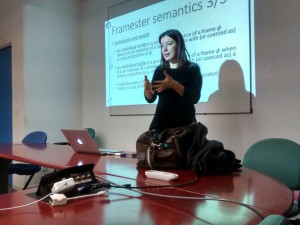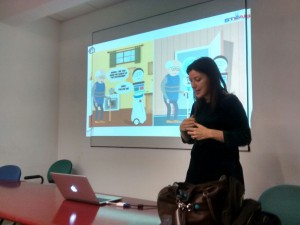Seminar at WIMMICS – INRIA
On February 9, at 10 am, Valentina Presutti and Luigi Asprino are giving a seminar at WIMMICS – INRIA at Sophia Antipolis.
Speaker: Valentina Presutti
Title: Using frames in assistive robotics
Abstract:
People with dementia (PwD) may show lack of memory as early symptoms of cognitive impairment. This affects their private as well as social life: discomforts can span from not remembering one or more words for completely expressing a concept or request, e.g. “I need a ?, to drink water”, to forgetting events they have recently experienced, e.g. a visit from a relative. In turns this may lead to isolation, hence loneliness. Machines, including robots, could help PwD by completing incomplete sentences, by suggesting hints for remembering events, by proposing them different activities: this would be a powerful tool for reducing their discomfort by increasing their autonomy. In this talk, I will discuss the approach we are investigating in a project that aims at developing a robot able to interact and support PwD. This approach relies on a notion of “frame” which is applied as a reference model abstraction to support the robot capabilities both from behaviour arbitration and interaction perspectives.
Speaker: Luigi Asprino
Title: Addressing knowledge integration with a frame-driven approach
Abstract:
Knowledge integration is the problem of automatically building a knowledge base by extracting and linking information coming from heterogeneous sources.
It is crucial in today’s real-world applications, consequently several communities (e.g. working on databases, web semantics, linguistics etc.) have faced this problem.
Regardless the way of representing information, that can be delivered either in structured (e.g. relational database) or in unstructured (e.g. plain text) format, human beings express information by reflecting the conceptualization they have in mind. Since 1974 Marvin Minsky introduced Frames as data-structures for representing the conceptualizations of stereotyped situations.
This cognitive-sound framework gained much attention in last years because the occurrences of frames have been recognized in several kinds of information sources (such as natural language, ontologies, encyclopedic resources etc.). In my PhD work I’m inquiring the possibility of using frames as background knowledge for the integration problem.
In this speech I will present the progress of this research and the challenges that will be faced in the next future.





